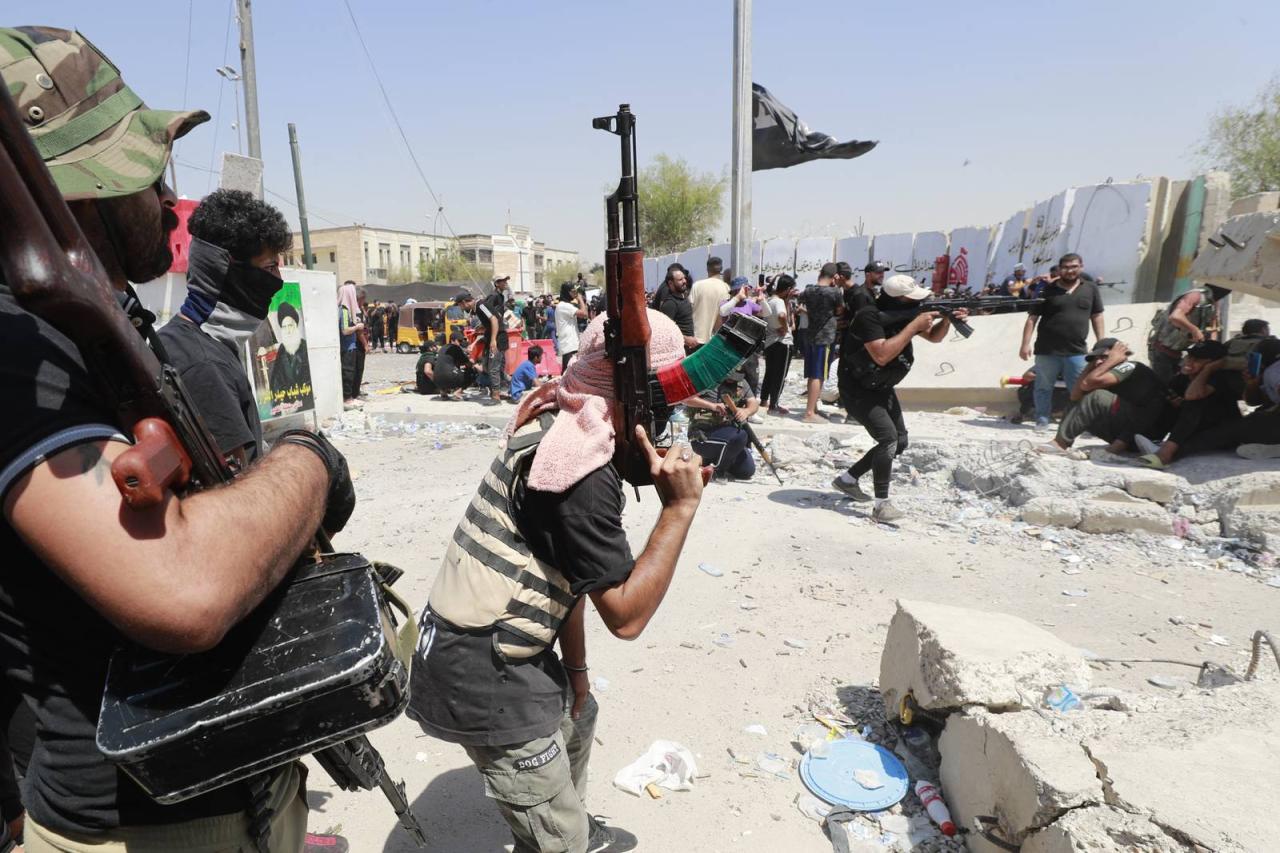The Iraqi Capital, Baghdad, was once again turned into a war zone this Monday night, after militia groups aligned with popular Shia cleric, Moqtada al-Sadr, opened fire on Iraqi security forces and attacked rival group offices.
This Monday, supporters of Moqtada al-Sadr, took over the Baghdad ‘green zone’ area, occupying government buildings and chanting in favor of their leader, after Sadr had announced his official resignation from politics. The popular Shia cleric has announced his withdrawal from political life various times before, however, at this time his supporters are attempting to undo the current Iraqi parliament.
The Sadrist demonstrators refused to back down when eventually confronted by Iraqi Security forces during the day, on Monday. In addition to this, various threats of violence were spread on social media, including incitement which was orchestrated online from foreign countries, according to al-Mayadeen reports. The conditions on the ground led to the Joint Operations Command, of the Iraqi security forces, deciding to impose a curfew in Baghdad from 3:30PM that day. The Sadr supporters, however, refused to leave after the time that the curfew went into effect, only deciding to head home hours later.
A curfew was later imposed all throughout the country, as fears continued to grow over violent escalation. That escalation unfortunately unfolded, as militiamen belonging to the pro-Sadr “Saraya al-Salam” armed group headed towards the green zone area. In videos captured and posted on social media, Moqtada al-Sadr loyalists were recorded chanting in favor of the men of “Jaysh al-Mehdi”, the name formerly given to the militia that fought for Sadr against the US occupation forces in Iraq.
Reports indicated that Saraya al-Salam and other pro-Sadr militias fired at least four missiles into the green zone area, in Baghdad, entering into direct confrontations with Iraqi security forces. The violence was not limited to the green zone, however, it spread throughout Baghdad, Basra, and beyond. Sadr loyalists burned down the offices belonging to pro-Iranian militia groups and political parties, burned posters of PMU leader Abu Mahdi al-Muhandis, and pulled down banners depicting Iranian General, Qassem Soleimani, who was killed in an illegal US airstrike in 2020.
At least 30 people were killed and over 700 were injured, including 110 Iraqi security service-members, during the armed clashes that took place. Surprisingly, despite it being the loyalists of Moqtada al-Sadr who were responsible for the violence, Sadr himself was quick to distance himself from his own militiamen and declared a hunger strike “until the violence ends”. Reports emerged of attacks from Daesh terrorists against pro-Iranian armed groups, located in the town of Amirli, also took place.
The following day, Moqtada al-Sadr delivered a fiery speech in which he threatened to disown his own supporters if they did not stop their protests and called for an end to the violence. Sadr apologized and expressed his embarrassment during his speech, confirming that none of the pro-Iranian groups belonging to the Popular Mobilisation Units (PMU) had launched any offensive actions. The Sadrist demonstrators followed the orders of their leader, leaving their protest tents that had been set up and Iraq then announced that its nationwide curfew had been dropped.
The line that Moqtada al-Sadr has maintained, of distancing himself from his own militiamen, condemning violence, and calling for dialogue in order to fulfill his own demands, is very likely deceptive. Sadr is known for flip-flopping on different issues and claiming that he won’t ever return to politics, but returns each time with greater political capital. The reason he announced his withdrawal from politics altogether, was due to the failure of the Iraqi parliament to comply with his demand to dissolve it within a 72-hour deadline, which he gave last Friday.
The Sadrist bloc in parliament held the largest number of seats in Iraqi parliament, 73, after the latest election in Iraq, last October. However, in June, all of his party’s MP’s decided to withdraw from parliament and in July Sadr’s supporters stormed the parliament in opposition of the Iraqi parliaments nomination of a pro-Iranian politician for post of Iraqi Prime Minister.
It is clear that Moqtada al-Sadr has been taking all the necessary steps in order to have his demands heard and listened to. Sadr’s ability to block the election of a Prime Minister, the formation of a government, and to pressure the parliament to dissolve, clearly shows his power in Iraq. In the case of the most recent violence, it is very likely that through utilizing his militia forces, he has sent a warning to the Iraqi establishment, and if he continues to be ignored, could send his men back out to escalate into a fully-blown civil war.
Sadr, who paints himself as a reformed Iraqi nationalist, has been the favorite of Washington’s think tanks, since last October’s elections. The US Government sees him as the best option to combat Iranian influence inside Iraq, which he and his supporters have vowed to rid the country from. At this moment, not every detail is clear about what has just unfolded, but on the surface, it would seem that Moqtada al-Sadr has just asserted himself strategically and chosen to pursue the path of dialogue with now having given his rivals a taste of what is to come if they don’t listen. All of this favors the position of Washington, which seeks a means of pressuring Iran and eliminating its influence in Iraq where it is possible.
Related posts:
Views: 0
 RSS Feed
RSS Feed















 August 31st, 2022
August 31st, 2022  Awake Goy
Awake Goy 
 Posted in
Posted in  Tags:
Tags: 
















